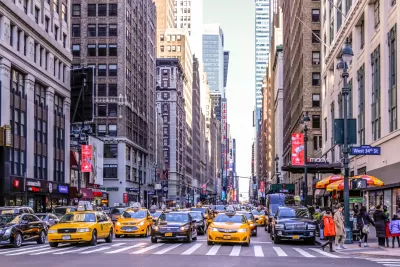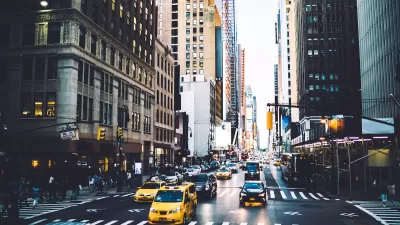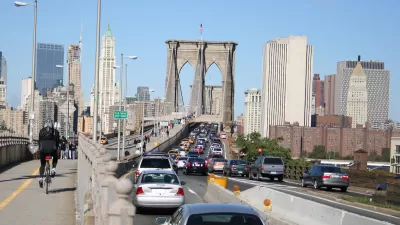Starting this summer, drivers will have to pay a toll to drive through the newly designated Congestion Relief Zone in New York City’s Central Business District.

ABC 7 Eyewitness News reports that, five years after passing in the state legislature, New York City’s controversial congestion pricing plan will go into effect on June 30. During peak hours (5 a.m.–9 p.m. on weekdays, 9 a.m.–9 p.m. on weekends), the toll structure for vehicle travel through the Congestion Relief Zone will be as follows:
- Cars: $15 toll during peak hours, and $3.75 overnight
- Trucks and buses: $24 or $36 (depending on size and purpose) and $6 and $8 overnight
- Motorcycles: $7.50 a maximum of once a day.
- Passengers of taxis, green cabs, and for-hire vehicles: $1.25 per trip
- Passengers of high-volume for-hire services like Lyft and Uber: $2.50 per trip
MTA officials say these tolls will result in 100,000 fewer vehicles entering the area every day, leading to less traffic, cleaner air, and revenue that will go toward public transit investments. ABC 7 also reports the MTA launched a portal for people to learn about eligibility for discounts or exemptions, which they can already start applying for.
The program will be the first its kind in the United States, though congestion pricing is quite popular in Europe. Opponents say the fees will burden workers, result in higher prices of goods transported into the city by truck, and simply shift congestion outside of the zone. There are also multiple pending lawsuits from small business owners and the state of New Jersey that have yet to be. Proponents say if done right, the plan could pave the way for similar congestion pricing plans across the country.
FULL STORY: MTA announces official start date for congestion pricing in New York City

Alabama: Trump Terminates Settlements for Black Communities Harmed By Raw Sewage
Trump deemed the landmark civil rights agreement “illegal DEI and environmental justice policy.”

Study: Maui’s Plan to Convert Vacation Rentals to Long-Term Housing Could Cause Nearly $1 Billion Economic Loss
The plan would reduce visitor accommodation by 25% resulting in 1,900 jobs lost.

Planetizen Federal Action Tracker
A weekly monitor of how Trump’s orders and actions are impacting planners and planning in America.

Waymo Gets Permission to Map SF’s Market Street
If allowed to operate on the traffic-restricted street, Waymo’s autonomous taxis would have a leg up over ride-hailing competitors — and counter the city’s efforts to grow bike and pedestrian on the thoroughfare.

Parklet Symposium Highlights the Success of Shared Spaces
Parklets got a boost during the Covid-19 pandemic, when the concept was translated to outdoor dining programs that offered restaurants a lifeline during the shutdown.

Federal Homelessness Agency Places Entire Staff on Leave
The U.S. Interagency Council on Homelessness is the only federal agency dedicated to preventing and ending homelessness.
Urban Design for Planners 1: Software Tools
This six-course series explores essential urban design concepts using open source software and equips planners with the tools they need to participate fully in the urban design process.
Planning for Universal Design
Learn the tools for implementing Universal Design in planning regulations.
Caltrans
Smith Gee Studio
Institute for Housing and Urban Development Studies (IHS)
City of Grandview
Harvard GSD Executive Education
Toledo-Lucas County Plan Commissions
Salt Lake City
NYU Wagner Graduate School of Public Service





























